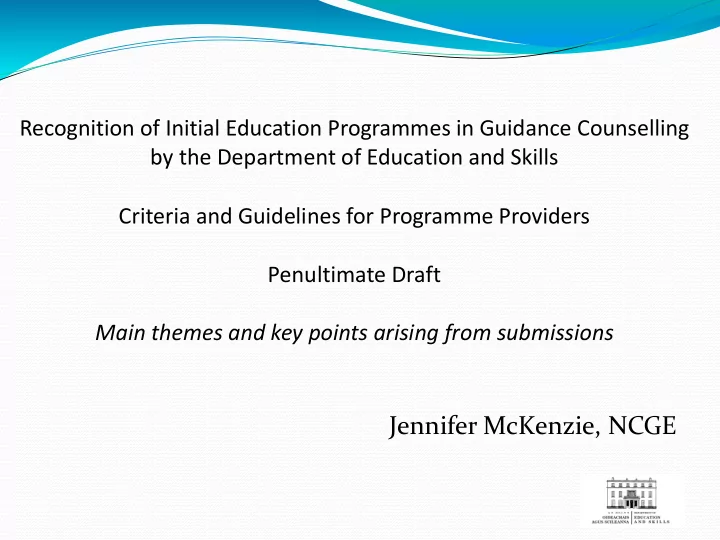

Recognition of Initial Education Programmes in Guidance Counselling by the Department of Education and Skills Criteria and Guidelines for Programme Providers Penultimate Draft Main themes and key points arising from submissions Jennifer McKenzie, NCGE
Submissions received from Directors of Studies of IGC Guidance Counselling AEGAI (DSGC) Former Presidents IGC NUIM – Adult Jennifer O’Rourke NUIM – Education Ronny Swain TUI Josephine McGread
Key Themes arising NFQ – credits & contact hours Selection of Students Programme / Provider Staff Counselling in guidance counselling Competence & Learning outcomes Placement Assessment of Learning Other – e.g. sector specific
NFQ NFQ level 8 NFQ level 9 60 credits (ECTS) Professional practice - initial education and guidance skills development programme Not a research Masters programme Encourage to continue to post – qualification Masters In Guidance Counselling level 9 Timing – 1 or 2 years; Full time or Part time
Selection of students • NFQ Level 8 on entry • Prior counselling training • Previous teaching / other relevant experience • Teaching qualification necessary / not necessary • Adult guidance – minimum NFQ level 7 • Academic and personal suitability for the role • Students would complete Personality and IQ test • Students would not complete personality tests • Need for formal RPL / APEL process
Programme / provider staff Programme staff should be qualified guidance counsellors with guidance counselling experience Staff from outside State should have clear understanding of Irish education system Guidance Qualified staff not always feasible – other relevant qualifications should apply – psychology / counselling / education ? Clarification required between external staff in Provider institutions and external agencies contracted by Providers Issue of part time / contracted staff – should be experienced qualified guidance counsellors Concerns regarding requirement of level of qualification of Provider staff and their relevant experience in guidance
Counselling in Guidance Counselling Counselling as a core competence noticeably absent Counselling is a key activity of guidance counselling Reference made to Guidance and Counselling Reference to role of counselling in guidance within in schools and adult guidance contexts
Competence and Learning Outcomes Include lifespan development and adult related issues not just schools’ role Labour market requirements 5 Competences / 7 competences / 8 Competences Too descriptive / More information required
Competence and Learning Outcomes contd. Specific to career learning and development – not just classroom Need for group approaches , innovative approaches to delivery e.g. Creative facilitation Psychometric testing – is a competence in its own right – different skill set for administration, feedback etc. Psychometric Testing Level A and Level B training required
Placement Minimum 2 days per week x 30 weeks = 60 days 30 days excessive Major and minor placement for variety of experience – schools / adult / FET and HE Industry placement - e.g. HR depts. Foundation for professional practice presented under each of the areas of competence
Placement contd. Assessment of placement – stating that student guidance counsellor is ready for responsibility Placement Mentor experience - 5 years may not currently be feasible / 5 years experience essential Clarity required on assessment and monitoring of placement – e.g. role of Provider supervisor vs role of Mentor # Mentor is not assessor / mentor part of assessment CPD for mentors necessary
Assessment of learning Meet Academic requirements at NFQ 8 Assessment of placement – role of supervisor / mentor in assessment Learning journal/ portfolio / tape work Psychometric testing training and assessment Students attending counselling – mandatory / not mandatory Counselling Skills assessment
Other – general Sector specific learning outcomes to include labour market guidance provision Request for clarification on how 8 competences were chosen Issues such as Ethical issues not covered in more detail Requests for required number of contact hours References made to the changing role of guidance counsellor in education and adult guidance sectors References to changes in resources / funding for guidance and impact of same, example: mentors with experience now retired
Recommend
More recommend